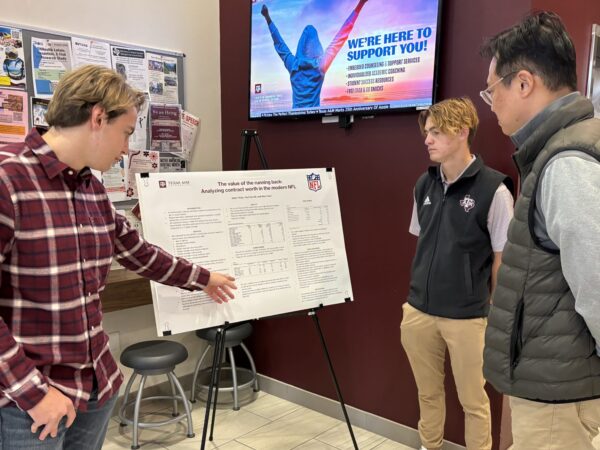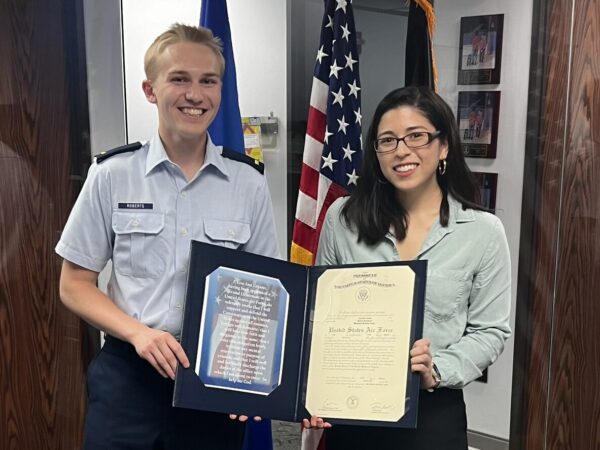A study of English language learners’ spelling will help develop intelligent tutoring systems
In Texas, more than 29 percent of the population speaks Spanish at home and more than 14 percent say they speak English less than “very well” according to the U.S. Census Bureau.
For Spanish-speaking English language learners, the complex spelling system of English is part of what makes learning how to write and read much more difficult. Literacy expert Dr. Kay Wijekumar hopes to change this.
Wijekumar, alongside a team of researchers, recently published a study analyzing ELLs and their writing. She said the study is part of a broader scope to find challenges facing native Spanish-speaking English learners and ways to address them.
Part of Wijekumar’s research in the Department of Teaching, Learning & Culture at Texas A&M is reading comprehension and writing skills in ELLs. She uses the research to improve intelligent tutoring systems — computer-based, immediate and customizable instruction for learners.
She said programs such as Microsoft Word and spell-check features have led to the misconception spelling does not need to be emphasized.
“You’re not going to have Microsoft Word all the time,” Wijekumar said. “If you’re asked to write something on paper, you’ll have difficulty. But even more than that, Word and these other tools can’t find the correct spelling such as ‘weather’ and ‘whether’ for example. So people continue to make all kinds of bizarre mistakes and that’s problematic.”
Spelling matters
The study reviewed writing samples of over 500 ELLs between the fourth and sixth grades who were asked to respond to a prompt. The samples were then analyzed for key indicators of ELL spelling challenges.
Their results showed as ELLs progressed through elementary school, their spelling improved and most errors were vowel and consonant omissions, which she said are easily taught.
Wijekumar emphasized the indicators are an important part of where a child stands on reading comprehension as it can affect their writing skills by lessening their vocabulary.
“They get really bogged down by these things and their writing quality just goes straight down because they get hung up on spelling. What frequently happens is they then replace the word with something simpler they know how to spell and carry on,” she said.
“Instead of saying, ‘It was cold outside,’ you say, ‘Oh my goodness, I was chilled to the bone!’ That sends a different kind of message,” Wijekumar said. “For multiple reasons, spelling actually is a really important aspect of children’s learning.”
New Chapters
Wijekumar said the study will help further two of the intelligent tutoring systems she’s helped to develop through her directorship of the Center for Urban School Partnerships. One is known as the Intelligent Tutoring System for the Structure Strategy and the other as Structure Strategy with Web-Based Adaptive Tutoring for EL Learners.
“Rather than sit and memorize vocabulary words and try to spell them, we are able to provide real-time training that allows students to understand the process of reading and writing by explaining where the errors are,” she said.
SWELL was developed in 2011, a decade after the launch of ITSS, and works with two types of ELLs — those who are more Spanish proficient who need assistance transitioning to English and those who understand English but require more understanding of vocabulary and assistance with linguistic modifications.
Wijekumar said the research into ELL spelling has helped refine and reframe to continue building a better system.
She added the systems are not just helpful for ELLs but can help any student struggling with reading comprehension and writing.
About the Writer
Justin is a native of Harlingen, the capital city of the Rio Grande Valley in Deep South Texas. He graduated in 2021 from The University of Texas Rio Grande Valley with a Bachelor of Liberal Arts, majoring in Mass Communication with a concentration in Print Journalism. Justin is responsible for writing news and feature stories for the College and its various departments to be featured via the web, social media, and various other media outlets.
Articles by JustinFor media inquiries, contact Ashley Green.














